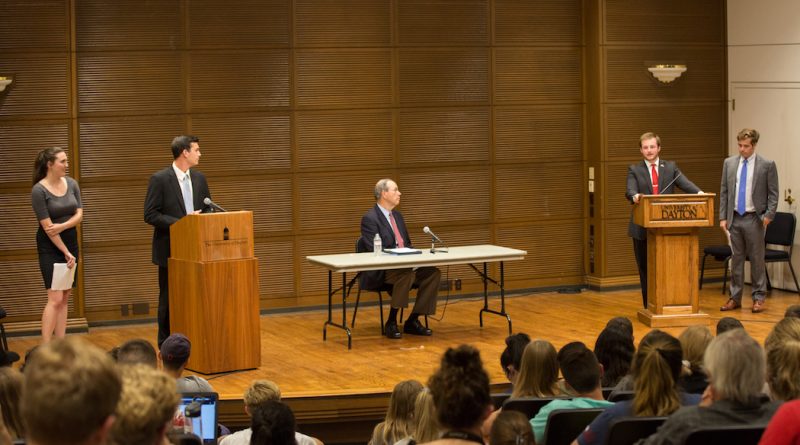College Republicans, Democrats Spar Over Major Issues
Sears Auditorium was packed on Oct. 9 with students witnessing the third annual debate between College Democrats and College Republicans.

The event, sponsored by Vote Everywhere, featured junior Thomas Pedrotti and senior Abigail Dibadj, president and vice president of College Democrats, and senior John Gomez and junior Griffin Weasel, president and vice president of College Republicans. The debate was moderated by political science professor and former Ohio governor Bob Taft.
The evening began with opening statements from each team and a question from Gov. Taft about why the midterm election on Nov. 6 is important. The Republicans began by pointing out the number of close races in Montgomery County alone that could set the course for future actions.
“At every level, your vote matters,” Gomez said.

Democrats agreed this election is an important one, but for a different reason.
“When one party controls all three branches of government, you get complacency,” Pedrotti said. “Democrats need to take back seats, especially in the House (of Representatives), to restore inclusivity.”
The next question centered around health care and changes to federal policy. Democrats went first and supported the Affordable Care Act (ACA), also known as Obamacare.
“The United States is the only country in the industrialized world that does not provide health care as a basic human right,” said Pedrotti. “The solution to this is a single-payer system.”
Citing the example of British baby Charlie Gard, Republicans reasoned a single-payer system would hurt the country.
“With socialized health care, you get socialized decisions about life and death,” Gomez said. “I don’t think we want this.”
The conversation then turned to the economy with an emphasis on the Tax Cuts and Job Act of 2017.
“Prices have been dropping across the country, and the stock market has been doing well,” Weasel offered. “We support these tax cuts but would not like to see the deficit increase.”
Democrats countered by reasoning that, although this legislation was intended to help the middle class, it is not doing its job.
“If Congress really wanted to make sure tax cuts would drive the economy, they should have at least made sure small businesses receive the same benefits as corporate ones,” Dibadj said.
Republicans took issue with a comment Dibadj made that the cuts the middle class is getting are “crumbs”.
“Please go to rural Ohio and tell the people there that the $3,000 cut a year that those are crumbs,” Gomez quipped.
Dibadj explained the “crumbs” comment referred to the amount of money most Americans are receiving due to the act compared to the richest one percent.

Gomez and Dibadj then took on the issue of immigration, a personal matter for both. Dibadj’s grandfather came to the U.S. from Iran, while Gomez’s father is from Spain. Both agreed the immigration system is broken and needs solutions. The Democrats brought up fixes like ending the travel ban and detaining children, while Republicans offered their idea for an updated guest worker program and enforcement mechanisms.
The final question from Gov. Taft pertained to gun control. College Republicans came out in strong support of the Second Amendment and opposed the notion of an assault weapon ban.
“Stricter gun laws lead to more crime, so we believe gun control is counterproductive,” Weasel said.
College Democrats pointed to the high amount of gun violence in America and laid out several changes they would like to see.
“We need to eliminate loopholes in background checks, limit the availability of high-powered weapons being sold and institute red flags laws to keep guns out the hands of people who pose a threat to themselves and others,” Pedrotti said.
In their rebuttal, Republicans said they also see a need for red flags laws and stricter background checks. However, the legislation would need to maintain the rights guaranteed in the Constitution.

The debate was then opened to questions from the audience, which ranged from inquiries about military spending to abortion. Both sides also got a chance to comment on the controversy surrounding the recent appointment of Brett Kavanaugh to the Supreme Court. All debaters agreed on the importance of believing survivors of sexual assault, however, Gomez said there was “no evidence” Kavanaugh committed the things of which he was accused.
Several follow-up questions were asked in response to what debaters had said earlier in the evening. Dibadj again was asked to clarify her “crumbs” comment regarding tax cuts, while Gomez was asked about the ethics and morality surrounding health care.
He disagreed with Pedrotti’s claim that poor people die in the U.S. because they can’t afford health care.
“…it’s just not true. In the United States, GoFundMe has become one of the biggest private health insurers, which is a great thing,” Gomez said.
Forbes reported one in three fundraisers on GoFundMe are to raise money to cover healthcare costs.
The closing statements from both sides emphasized the friendships and bipartisanship that exists between the two student organizations.
“Thomas and Abigail are two of my best friends, so there’s no bad blood between us,” Gomez said.
The audience voted on which side they believed won, and College Republicans were victorious.
Sparing continued on Twitter after the event ended. UD senior and chairman of the Ohio College Republicans Tom Ferrall responded to a post congratulating the Democrats on their performance by saying, “The voters, as usual, disagreed with you.” Pedrotti responded simply by tweeting “Nov. 6”.

Recordings of the student debate are available both on UD College Democrats’ twitter (@udaytondems) and UD College Republicans’ twitter (@UDRepublicans).

